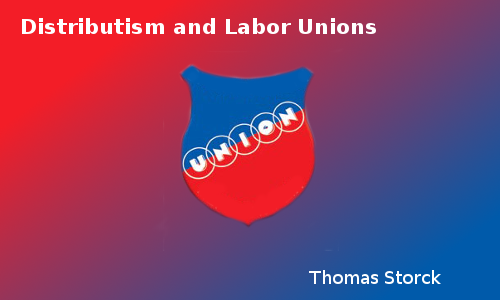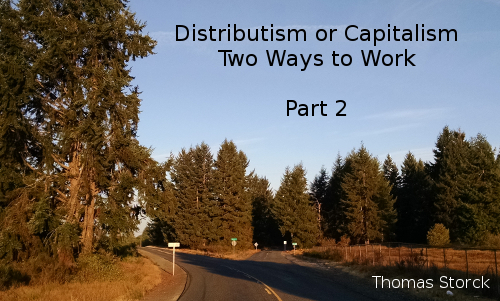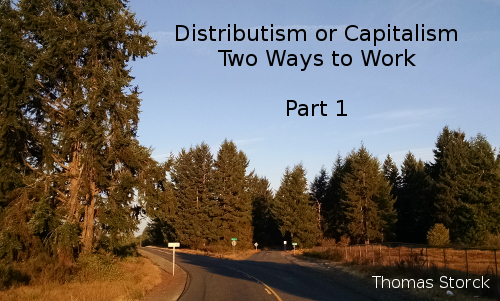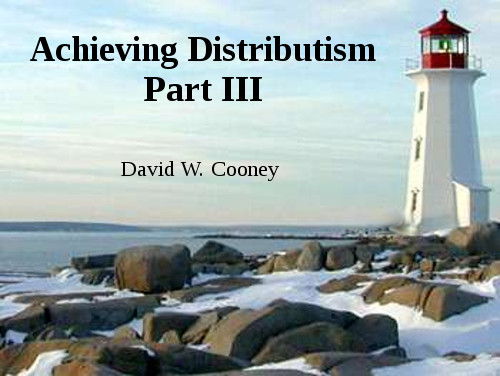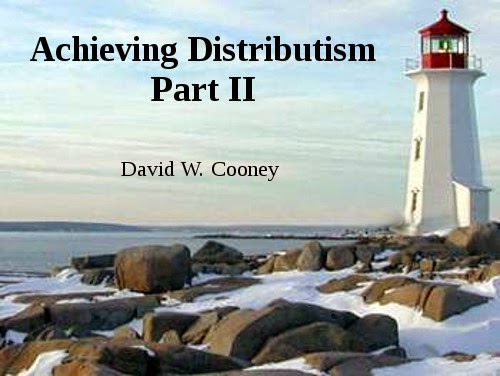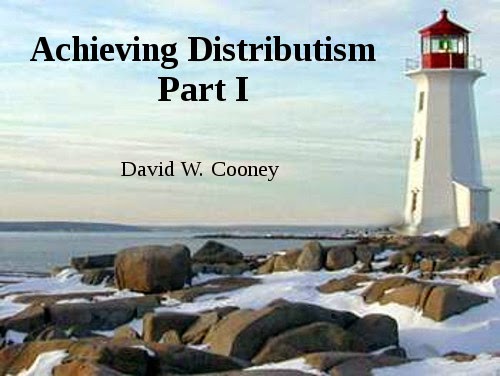In a recent article for The Week, Jeff Spross makes a fair claim against the standard "conservative" rhetoric that the real solution to the problem of poverty is for those in poverty to start working. He also addresses the position of some conservatives who say that we can never truly address the issue of poverty because it is such a complicated human problem. Mr. Spross points out fatal flaws with this claim, but fails to see the fatal flaw in what he presents as the solution.
18 December, 2015
03 December, 2015
Where's our economic recovery?
26 November, 2015
Practical Distributism and The Distributist Review
We give thanks!
We are happy to announce that The Distributist Review has relaunched its site. For any of you who were not previous readers of the DR, I encourage you to head over and check it out. For those of you who were, I'm sure you share our enthusiasm that the wait for its return is over.
Logo for The Distributist Review © The Distributist Review. Used with permission.
Logo for The Distributist Review © The Distributist Review. Used with permission.
05 November, 2015
House Rulez
What limits are there to what people will do for money or some other form of success? This question is the basis of what is called, “reality television.” While some people point out that the situations of these shows are unreal, the “realities” that are being presented to us are the decisions of the people in these situations. What alliances will they make and break? What lies will they tell? What are they willing to do to each other? To what will they subject themselves in order to win? House Rulez takes these questions to a new level.
26 October, 2015
Distributism and Labor Unions
It has sometimes been said that distributism, the economic system that promotes widely distributed productive property - whether this is owned by a single proprietor, a family, or a worker cooperative - is hostile to labor unions and the labor movement. While I do not deny that there may have been someone who labels himself a distributist who at one time or another said something negative about the labor movement, the central distributist movement, exemplified by theorists such as Hilaire Belloc or G. K. Chesterton, and of late by organs such as Practical Distributism or The Distributist Review, has not embraced such a position. Any apparent hostility is based upon a misunderstanding of the differences between a capitalist economy and a distributist economy. For example, when Belloc wrote that a union "is a proletarian institution through and through and a proletariat and a proletarian spirit is exactly what we are aiming to destroy,"[1] he was simply noting that in a distributist society the labor market divide between owners and workers, which is the hallmark of capitalism, would not exist, or would hardly exist. Since distributists desire a proliferation of small economic units - workshops, stores, farms - it is obvious that in such entities there would be no labor movement because there would be no labor. Or to put it more precisely, the worker would be the owner, and the owner the worker. There would be no need for him to form a union to protect his interests against himself. Entities that of necessity required a large facility with a large workforce would, according to the distributist model, be employee owned and administered by the workers themselves. Again there would be no need for a union. Thus Belloc is not exhibiting any hostility toward workers but rather hopes that their status may be improved by making them owners.
15 October, 2015
Socialism and the Early Distributists
Distributists are often accused of being socialists, or at least quasi-socialists. This is a claim which we vehemently deny. However, it might be a surprise to know that some of the early distributists were involved in the early socialist movement. Does this fact not give credence to the claim that distributism is a form of socialism? Does this mean that distributists are being dishonest or inconsistent about the origins and aims of the distributist movement? These are serious questions which we must be prepared to answer. Although many people seem to be growing disillusioned by capitalism, the majority are not so deluded as to accept socialism. In order to address the issue, we must look at the beginnings of both the socialist and distributist movements.
01 October, 2015
Distributism or Capitalism: Two Ways to Work - Part 2
Next we come to what we term one's competitors, that is, those producing or selling the same sort of product. Under capitalism such producers are pretty much the enemy. Though there is a certain amount of collaboration on shared concerns - such as lobbying the government on matters of interest for the entire industry - generally it is held that since it is the natural aim of each business to increase its income without limit, the success of one firm always comes at the expense of the other firms. Each is competing for as much market share as possible. And such an attitude flows logically from a concern solely with profit and "the amount of wealth accumulated by the dealer." But if sellers and producers see themselves as supplying a need of the public, there is no reason why they cannot regard their fellow sellers and producers as partners in the same effort. Provided that sellers or producers make a profit sufficient to cover costs and provide for their livelihood, why should they wish that other sellers or producers of the same product suffer or go out of business?
24 September, 2015
17 September, 2015
Independent Publishing: An Interview with Matt Vancil
In order for people to be able to see that distributism can actually work, to see that it is actually something practical instead of some Utopian fantasy, we need to be able to provide practical alternatives for doing things in ways that are more in line with the distributist ideal than the currently prevailing methods. Fortunately, there are people out there who are already doing this. Many who would not call themselves distributists, who may have never heard of distributism, are already trying to accomplish things in ways that happen to be more in line with distributism. One person who is in this category is Matt Vancil. Mr. Vancil has written independent films like JourneyQuest and The Gamers, and is involved with the production team at Zombie Orpheus Entertainment. He recently published his first novel, PWNED, which is available through the Fan Supported Network and Amazon, and agreed to sit with me to discuss his experience as an independent publisher.
03 September, 2015
Distributism or Capitalism: Two Ways to Work - Part 1
When human beings engage in economic activity they engage with other people. Even a gardener cultivating his own small plot has probably obtained his seeds and his tools from others and at least depends upon the larger society for the social stability that allows him to plant his garden with a reasonable expectation that he'll be able to harvest his crop later. But most often economic actors relate in many more obvious ways with others, with employees, with customers, with those we call competitors, and in a sense, with the general public or society itself. Each way of organizing economic activity, each economic system, necessitates or at least makes probable certain ways of interacting with these other persons and groups. Let us examine the contrast between how capitalism and distributism do this. But first, how do we define these two economic systems?
01 September, 2015
Movimento Distributista Italiano
Here is another distributist web site to check out.
Movimento Distributista Italiano
Like this site, they have enabled the translate feature for others to read their articles.
Movimento Distributista Italiano
Like this site, they have enabled the translate feature for others to read their articles.
20 August, 2015
Price
I have presented in several articles that distributism is not just another way of juggling numbers in an attempt to make sense of economics. Just as capitalism and collectivism are fundamentally different ways of envisioning the economic and political environment of a society, distributism is yet another way that is fundamentally different than those views. Some people think that distributism is an attempt at a "middle ground" or blending of capitalism and socialism. In fact, such a blending will result in what Belloc called the Servile State - something entirely different than what distributism hopes to achieve. It can be difficult for distributists to appreciate just how fundamental these differences in economic views are, and that makes it difficult to appreciate just how much of a change we are asking of those we are trying to convince. We face tremendous obstacles in trying to establish even some of what distributism proposes. I would like to present an example of this by considering the concept of price, and the difference between the capitalist "market price" the masses have been taught to accept, and the distributist "just price" we are trying to help them understand.
06 August, 2015
Whence Comes Government Authority?
The answer to this question is important for determining if there are any limits to the authority of government and, if so, what those limits are. It will help us to understand when those who wield the power of government have gone too far in the exercise of that power. It will help us to identify when groups of people actively seek to manipulate government to do things that are an abuse of its power.
04 August, 2015
An Objection to Distributism That Just Doesn't Fly
For those of you who subscribe, Dale Ahlquist has an excellent article about Distributism and industries like airlines in the latest issue of Gilbert Magazine.
For those of you who don't subscribe, I recommend you head on over to The American Chesterton Society to rectify the situation.
For those of you who don't subscribe, I recommend you head on over to The American Chesterton Society to rectify the situation.
03 August, 2015
Opus Publicum
I'd like to say thank you to Opus Publicum for suggesting Practical Distributism as a site its readers should check out. I've noticed a lot of visits from that post.
In an effort to return the favor, I recommend to our own readers that they should check out Opus Publicum. It covers a broader spectrum of issues than Practical Distributism, and offers much food for thought.
David W. Cooney, Editor
In an effort to return the favor, I recommend to our own readers that they should check out Opus Publicum. It covers a broader spectrum of issues than Practical Distributism, and offers much food for thought.
David W. Cooney, Editor
18 June, 2015
Achieving Distributism - Part III
There are two social foundations of distributism; decentralized political authority according to the principles of subsidiarity, and the wide-spread private ownership of productive property. When established, these foundations will result in greater freedom for individuals and families throughout society in general and a more stable national economy supported by strong local economies. What is needed to actually achieve this? I believe it starts with shifting our philosophical outlook. We need to realize that economics is not the kind of science we have been told it is. We need to look beyond the immediate end of our economic activities and see how those activities fit within the overall community. If we do this, we will start to see how a local community is self-supporting in ways that corporate capitalism is not. We will start to see that, when we consider how our economic decisions can benefit or harm others in our community, we will all benefit.
04 June, 2015
Achieving Distributism - Part II
Asserting the right to own private property is not the same as asserting the right to acquire unlimited amounts of it, nor is it the same as saying there are no other limitations in regard to that acquisition. This is one point where capitalists will raise a huge objection. We must keep in mind that the basis of the right to private property is the right to secure for oneself, and one's family and heirs, the basic needs of life and the ability to achieve a good standard of living according to the social norms of the society at large. This is not merely a social right; it is a right based on our very existence as rational beings. Those who do not have this must be able to better their situation so that they do, and society must be structured so that anti-competitive forces cannot act to hinder them from being able to accomplish this for themselves.
21 May, 2015
Achieving Distributism - Part I
There is a persistent question which is hurled before us as a gauntlet. Just how do distributists propose that we achieve the wider distribution of productive property? We are accused of secretly advocating a powerful central state on the grounds it is necessary to forcibly redistribute the property to fit our scheme. We are accused of having no plan other than to rob the current owner of what is lawfully his in order to give it to others. This is a charge that must be taken seriously and clearly answered.
27 April, 2015
Who's Looking Out For You?
As we approach the 2016 election run in the United States of America, you can expect the usual claims from both of the major political parties about how they are really on your side. You probably know the narrative. Republican candidates will assure us that the Democrats are all about big government taking away what you've earned to give it to someone else. Democrat candidates will assure us that the Republicans are all about giving tax breaks to the rich and don't care what happens to you. Some people may ask which of these parties is really on your side. I prefer to ask if either one is.
02 April, 2015
Your Tax Dollars
Here's a sobering thought. If we were to actually pay for what the government provides, our taxes would be almost doubled.
13 March, 2015
Wall Street vs Main Street
So says an article on CNN Money in a comment that is directed at Wall Street. What is most interesting about this comment is that it essentially admits what distributists have been criticized for saying for some time. The economic aims of Wall Street are in conflict with the economic needs of Main Street.
05 February, 2015
Devolution
At the beginning of his term as Prime Minister, David Cameron unveiled a program called the “Big Society.” The idea is to decentralize both legislative and tax authority from the central government and make them more local. Geographically, this plan goes beyond the states of the United Kingdom, and even beyond the county councils. The plan includes moving authority all the way to city leaders. This idea, known as “devolution,” is still on the minds of the English, and there appears to be an ongoing movement to make this idea a political reality. This is certainly an encouraging movement from a distributist perspective, but it faces some serious challenges.
03 January, 2015
Stocks: The Myth of Ownership
In response to my article on the nature of capitalism, I received some responses objecting to my statement that part of the definition of capitalism is that laws facilitate the separation of ownership from work. Well, not only do the laws of capitalism facilitate the separation of ownership from work, but they even seem to separate ownership from the rights of ownership.
Subscribe to:
Posts (Atom)





